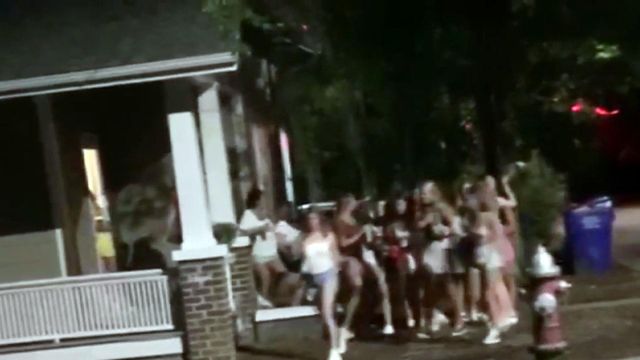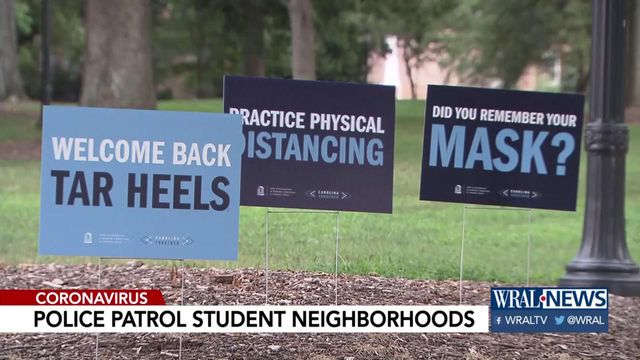Chapel Hill police to start enforcing pandemic rules if UNC student gatherings get out of hand
Days before classes begin at the University of North Carolina at Chapel Hill, Chapel Hill Mayor Pam Hemminger said Friday that citations will be handed out to people who violate the state's rule on holding large gatherings during the coronavirus pandemic.
Posted — UpdatedPolice will be stepping up patrols in "known problem areas" on Friday night, Hemminger said.
"We're sending a message that we really are serious about keeping people safe by not allowing mass gatherings," she said. "We are also working with the university to find out what kinds of things trigger their honor code process to see if that’s an option to help with this situation or not."
The crackdown comes days after a video was posted online showing a large number of young women not wearing masks or practicing social distancing outside a house on Ransom Street west of the UNC-Chapel Hill campus for a Chi Omega sorority event.
"I’d prefer that education worked. I’d prefer these gatherings didn’t happen," Hemminger said. "But if it takes a citation to get people’s notice and it’s an egregious violation, then that will be an option we will deploy if necessary."
Violating a state order during the pandemic is a Class 2 misdemeanor, which carries up to 60 days in jail and a $1,000 fine.
District Attorney Jim Woodall said most such charges would result in deferred prosecution, meaning students could simply pay a fine and court costs to avoid having a conviction on their record.
"For these charges, for the level of charge it is, it’s a very minor charge in the scheme of things," Woodall said, saying jail time would "likely never happen" in such cases.
To date, only four people have been charged in Orange County with violating the limit on mass gatherings, he said. The first defendant to go to court paid a $100 fine and $180 in court costs.
The Chi Omega gathering also apparently wasn't an isolated incident, as Chancellor Kevin Guskiewicz and other administrators put all fraternities and sororities on notice Thursday that they have heard of other large gatherings in recent weeks and continued violations of pandemic-related restrictions could costs organizations funding and access to campus facilities and could get students expelled.
"People have to take this seriously. It’s a virus that you don’t see with your naked eye. You don’t know where it’s coming from," said Amenata Kaba, a nurse who was moving her daughter into a dormitory on campus Friday.
"Parents need to talk to their children that this is very serious," Kaba said. "I have had this conversation with my kids as well – stay away, don’t party."
Penny Riordan, who also was moving her daughter onto campus, said she's unsure whether the threat of a criminal citation would be enough to stop students from gathering.
"They’re teenagers, young adults. Who can say?" Riordan said. "They just want to be social and get together, but having said that, it’s probably only going to hurt themselves because they’re going to have to go home because of this if they end up infecting everybody."
UNC-Chapel Hill administrators said they have tweaked their plans in response to such concerns by expanding virus testing capacity at UNC Hospitals, reducing capacity in dormitories and classrooms to 64 percent and 30 percent, respectively, and increasing parking on campus and transit options for people to commute and get around in Chapel Hill.
Related Topics
• Credits
Copyright 2024 by Capitol Broadcasting Company. All rights reserved. This material may not be published, broadcast, rewritten or redistributed.






